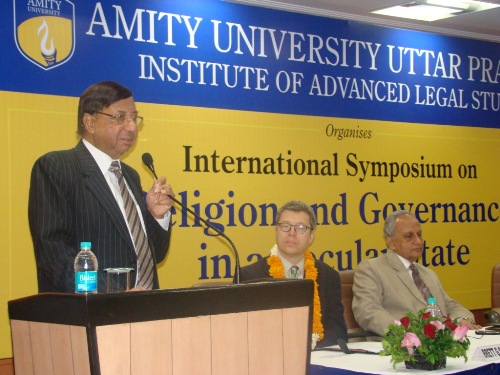Conference “Religion and Governance in a Secular State”– India, May 2011

9-10 May 2011 – New Delhi, India
In a conference co-sponsored by the Amity Institute of Advanced Legal Studies (India) and the International Center for Law and Religion Studies (ICLRS at Brigham Young University, United States), international experts gathering at the Amity Campus, Sector – 125 in Noida on 9-10 May 2011 to discuss “Religion and Governance in a Secular State.”
Inaugurating the conference and welcoming the august gathering, Dr. Ashok K. Chauhan, Founder President, Amity Group, said that Amity would like to spread quality and virtues through its students who can bring about societal peace and harmony in the country. To respect each other’s religion is one of India’s greatest strengths, said Dr. Chauhan. Religion and governance are equally important. Therefore, the political leaders, bureaucrats, and the administrative heads of the country should be spiritual. Dr. Chauhan said he hoped that the symposium should leave a sustainable effect and that the legal systems of India and the United States can develop new theories and laws, through innovation, self-confidence, and creativity.
In his inaugural address, Professor Dr. Tahir Mahmood, Director of the Amity Institute, noted that the symposium marked “the intellectual confluence of two democracies, namely, America and India” and reflected that “it is law that deters a state. Therefore, the concept of secularism is gaining importance in societies. … The Indian democracy is trying hard to keep perfect harmony between religion and governance. Today, our hunger and thirst for knowledge has brought us together to discuss and share our experiences on this platform.”
In remarks addressing “Secular Harzards to Secularity: How Erosion of Religious Freedom Threatens Secular State,” ICLRS Director Professor W. Cole Durham, Jr., explained that secularism should not be a harsh word but should rather provide a framework by means of which people can live in harmony. To this end, the ICLRS has organized conferences in Malaysia, Nepal, India, and many other parts of the globe to foster relations between religion and governance and to help build cultural and educational partnerships between countries. Professor Durham noted particularly the Center ‘s efforts to enhance its Web technology, enabling the building of Web-based legal libraries of international value, as the Internet “works wonders” in bringing people closer.
It is important, stressed Professor Durham, to internalize and reflect upon the ways in which institutions can ignite minds to bring goodness to society in an organized way. Religions remain phenomenally important for societies, and it is essential to show respect for the religions of others, which helps us all in our personal lives an in developing a secure present and future for all.
Center Associate Director Professor Brett G. Scharffs addressed the topic “Secularism and Secularity: Two Competing Frameworks for Constitutional Analysis,” commenting upon the praiseworthy dynamism in the growth and development of India and noted that values-based education, as imagined by great visionaries the world over, is essential for continued human progress.
Additional conference presentations included “Transformative Law as a Tool for Governance: Developing Support for Judicial Independence” by Professor John C. Reitz (Iowa, US); “Rethinking Tension between Judicial Independence and Accountability: Role of Court Structure” by Professor David Pimentel (Sarajevo, Bosnia–Herzegovina); ” Sovereignty of Religious Institutions in a Secular State: A South African Experience” by Professor Johan van der Vyer (Pretoria, South Africa); “Comparative Perspectives on Governance and Minority Rights,” by Professor Jenik Radon (Columbia, US); and ” Web Tools to Enhance Law and Religion Studies,” by Mr. Marshall Morrise (ICLRS Website Development Manager, US).